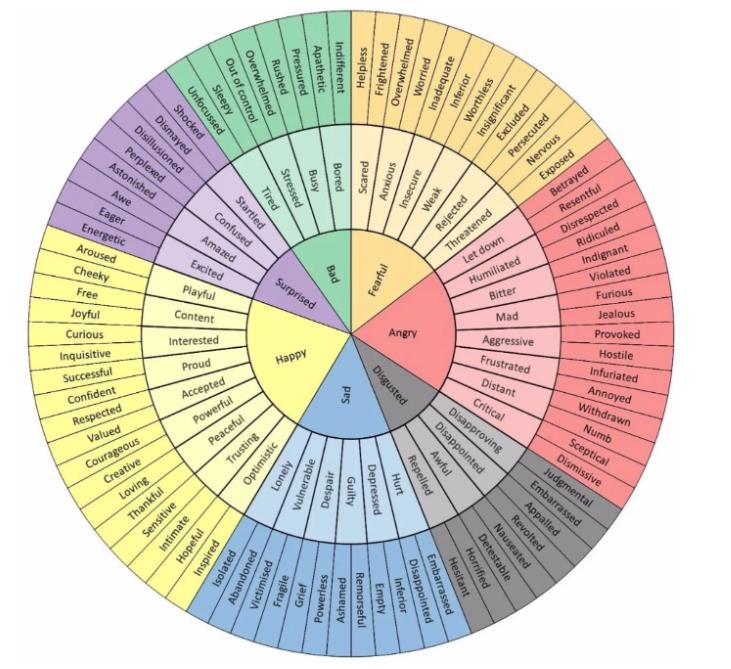Emotional Intelligence (EI) is the ability to recognise, understand, and manage your emotions. It’s also about being able to recognise, understand, and influence the emotions of others.
This can be developed at any stage of life and is key to building better relationships and improving your wellbeing.
Here are four key areas of emotional intelligence:
- Self-awareness
Developing your self-awareness is the first stage of building your emotional intelligence. Your self-awareness in an emotional context is the ability to understand your feelings and how they shape your perceptions, thoughts and impulses to act.
We all have emotions, but it can sometimes be hard to find the words to describe how we’re feeling. This is where the emotional wheel can help:

Reference: Image by @trainingsbyromy on Instagram.
By building your emotional vocabulary you will be able to better communicate your emotions to others so they can better understand you. As you talk about your emotions, you are developing a greater awareness of how you feel, what might be driving your emotions as well as managing them in a healthy way. Some emotions maybe easier to describe than others. You may have been taught that certain emotions are bad, or you shouldn’t feel a certain way. This may mean you have a better relationship with some emotions than others. No emotions are bad but your reactions to them may be helpful or hurtful. You cannot control your emotions, but you can control how you manage and respond to them.
- Managing your emotions
This is about how you process, regulate and respond to your emotions. You can’t manage what you don’t understand, so becoming aware of how you’re feeling always comes first.
Good emotional management is about responding to your emotions in an appropriate way that leads to positive outcomes and behaviours. It’s about responding in line with your values (who and how you want to be) rather than instantly reacting to how you feel.
One part of emotional management is making room for your emotions. This may seem counterintuitive, but making space to feel your emotions is the first step to healthy management. This may happen in the moment or in hindsight. A good way to do this is by making room for the physical feeling you are experiencing. This process is about fully accepting how you’re feeling, rather than avoiding, supressing, judging or wrestling with how you’re feeling.
Fusion is another element of emotional management and is where you become entangled in the emotion. It blends into you, and you become the emotion. When this happens your perceptions and behaviours are governed by how you feel. Defusion is the process of seeing the emotion as separate to you. You acknowledge it, make space for it, but can let it go. You’re able to observe an emotion, rather than become overly attached and controlled by it.
Understanding your triggers is important. Becoming aware of why certain people, situations or events cause an emotional response is a key part of building emotional intelligence. Many emotions can become conditioned responses from childhood events and experiences. Over time you can start to unpeel the wounds of the past to understand why you’re feeling how you are.
This self-management also consists of being able to have an optimistic and positive outlook, taking positive action and adapting to different life circumstances despite difficult emotions and thoughts.
- Social awareness
This is about being aware and identifying others’ emotions. This type of social awareness means observing others body language, their tone of voice and seeking to understand their perspective and mental state. This involves being focused and present as well as reflecting on previous interactions with others. You can hear what someone is “really” saying by being able to tune into how they’re feeling and show empathic concern both cognitively (understanding other perspectives), and emotionally (understanding someone else’s feelings).
- Social management
Social management is understanding how your actions and words influence the people around you. You can handle conflict and difficult conversations by listening to how someone is feeling and what they are thinking. You have safe emotional boundaries that mean you take responsibility for your own actions and emotions but not the actions or emotions of others. You can get along with others and keep your own disruptive emotions and impulses in check so you can effectively build relationships, communicate, and work with others for positive outcomes.
Emotional intelligence allows you to choose how you handle and respond to life’s inevitable ups, downs, disappointments, triumphs and challenges. You’re able to find a way to pause between stimulus and response rather than instantly react to your emotions. It takes plenty of practice to develop your emotional intelligence and is never a completed skill, but the endeavour to improve will likely be one of the most worthwhile endeavours in your life.
“People will forget what you said, people will forget what you did but people will never forget how you made them feel”.
Maya Angelou
Click here to get in touch to find out more about James Shirebys life coaching service